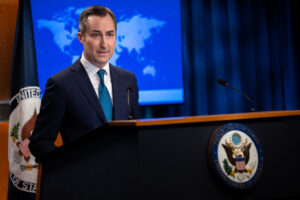Judge Rules Walgreens ‘Substantially Contributed’ to San Francisco Opioid Crisis
Pharmacy giant Walgreens “substantially contributed” to San Francisco’s opioid crisis by shipping hundreds of thousands of “suspicious orders” of highly addictive prescription drugs as part of a profit-driven “fill, fill, fill culture,” a federal judge ruled Wednesday.
The ruling by U.S. District Judge Charles Breyer in the non-jury trial means that Walgreens may be liable for much of the California city’s opioid epidemic. Breyer said he will hold another trial to determine Walgreens’ liability, the San Francisco Chronicle reports.
“Walgreens pharmacies in San Francisco dispensed hundreds of thousands of red-flag opioid prescriptions without performing adequate due diligence,” Breyer wrote in his ruling, which stems from the City and County of San Francisco v. Purdue Pharma case—popularly known as the Opioid Trial—which is classified as a “bellwether case” by federal courts due to its potential nationwide implications. Walgreens was the only company that did not reach a settlement with the city.
“The evidence showed that Walgreens did not provide its pharmacists with sufficient time, staffing, or resources to perform due diligence on these prescriptions,” wrote Breyer.
Moreover, Peter Mougey, an attorney representing San Francisco and other municipalities in opioid lawsuits, told The Washington Post that “Walgreens has hidden, covered up, and run from the truth throughout the entirety of this five-year litigation.”
“Walgreens knew its system to detect and stop suspicious orders was nonexistent but continued to ship opioids at an alarming pace to increase profits,” added Mougey. “San Francisco is now one step closer to starting the healing process.”
The San Francisco City Attorney’s Office hailed Breyer’s ruling as “a major victory.” San Francisco City Attorney David Chiu, a Democrat, said during a Wednesday press conference that “there is no amount of money that will bring back the lives lost. There’s nothing that we’re going to be able to do to reverse that tragedy, but our city continues to need resources to adequately address suffering on our streets and the tragedies that continue with that.”
Walgreens spokesperson Fraser Engerman told the Post the company will appeal the ruling, arguing that “we never manufactured or marketed opioids, nor did we distribute them to the ‘pill mills’ and internet pharmacies that fueled this crisis.”
Wednesday’s decision follows a $683 million opioid-related settlement between Walgreens and the state of Florida in May, as well as an Ohio jury’s November 2021 conclusion that the nation’s three largest pharmacy chains—CVS, Walgreens, and Walmart—recklessly distributed a deluge of pills in two of the state’s counties.
Originally published at Commondreams.org.











